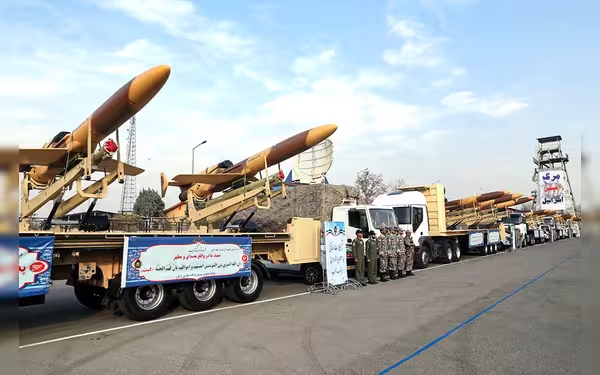Saturday, November 16, 2024 07:28 PM
Iraqi Pro-Iran Groups Claim Drone Attack on Israel
- Pro-Iran groups claim drone attack on Israel.
- Israel intercepts multiple aerial targets from Iraq.
- Hezbollah launches rockets at Israeli military sites.
 Image Credits: arabnewspk
Image Credits: arabnewspkPro-Iran groups in Iraq claim responsibility for a drone attack on Israel, escalating regional tensions amid ongoing conflicts.
BAGHDAD: In a significant escalation of regional tensions, an Iraqi coalition of pro-Iran armed groups has claimed responsibility for a drone attack targeting Israel. This incident occurred on Sunday, with the Israeli military reporting that it intercepted "multiple suspicious aerial targets" originating from Iraq during the night.
The coalition, known as the Islamic Resistance of Iraq, announced via a statement on Telegram that their fighters had targeted a "strategic location in the occupied territories" using drones. They emphasized that this action was taken "in support of our people in Gaza," highlighting the ongoing conflict and solidarity with Palestinian groups.
In response to the drone attack, Israel's military confirmed that it intercepted a "suspicious aerial target" launched from the east, stating that no damage or injuries were reported. This incident comes amid heightened tensions nearly a year into the Israel-Hamas war in the Gaza Strip, which has seen the involvement of various Iran-backed armed groups throughout the Middle East.
On the same day, the Tehran-backed Hezbollah movement in Lebanon declared that it had launched rockets at Israeli military industry sites. This was described as an "initial response" to recent attacks attributed to Israel, which resulted in the explosion of pagers and two-way radios used by Hezbollah across Lebanon earlier in the week.
The Islamic Resistance of Iraq, a loose alliance of Iran-backed factions, has previously claimed several drone attacks against Israel in recent months. However, the Israeli military has reported that all these attacks have been intercepted successfully. Last winter, this group also claimed responsibility for over 175 rocket and drone attacks targeting United States troops stationed in Iraq and Syria, prompting multiple retaliatory strikes by US forces against these militant factions.
Interestingly, the frequency of attacks on American troops has significantly decreased in recent months, suggesting a possible shift in strategy or a temporary lull in hostilities. The current situation underscores the complex web of alliances and enmities in the region, where actions taken by one group can have far-reaching consequences for others.
As the situation continues to evolve, it is crucial for observers to remain vigilant. The ongoing conflict not only affects the immediate parties involved but also has implications for regional stability and international relations. Understanding these dynamics is essential for anyone interested in the geopolitical landscape of the Middle East.













